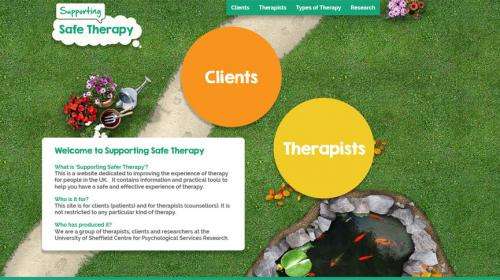Preventing the adverse effects of psychological therapies

In the AdEPT study (understanding and preventing the Adverse Effects of Psychological Therapies), researchers from the University's School of Health and Related Research (ScHARR) and the Department of Psychology, analysed the adverse effects of 'talking therapies' such as counselling and cognitive behaviour therapy.
The findings of the study, which was funded by the National Institute for Health Research (NIHR) Research for Patient Benefit programme, have been used to launch a unique website which provides useful information for service managers, clinical practitioners, and patients.
Psychological therapies, which have been shown to be helpful for people with common mental health problems such as anxiety, depression, post-traumatic stress and obsessive- compulsive disorder, are recommended by the National Institute of Health and Clinical Excellence (NICE).
Today more 'talking therapy' is funded by the NHS than ever before – which is why it is important to understand and prevent any detrimental effects it may have on patients.
AdEPT Chief Investigator, Professor Glenys Parry from ScHARR, said: "It has been known for a long time that some people get worse during or after therapy and there has been a lot of anecdotal evidence of people feeling they have been harmed by talking treatments.
"Until now there has been very little research on understanding and preventing negative results from psychological therapy."
She continued: "From an initial scoping review we distinguished between adverse events, adverse effects, deterioration and harm. We discovered the issues that were linked to failed therapy, including therapist competence, service pressures and constraints, and problems in the therapeutic relationship.
"Although some individuals do have a bad experience of therapy, there was no overall evidence that psychological therapy was causing harm."
Researchers found that the proportion of clients showing reliable deterioration varies a lot between therapists. However, when the research team compared the number of people who feel worse after therapy with those who feel worse anyway, without therapy, they were very similar once they accumulated evidence from a number of studies.
A variety of research methods were used during the study including surveys, quantitative study of the experience of therapists and therapy recipients of failed therapy and the analysis of data from randomised controlled trials, comparing a psychological treatment with no treatment control, to investigate risk of harm.
Professor Parry, continued: "All medical and health interventions carry potential risks as well as benefits; even everyday medications have some toxicity for some people.
"Harm from psychological therapies is fortunately rare compared with the benefit, but we need to reduce the risk of harm. It is important to remember that just because someone has become worse over the course of the treatment it does not mean that the treatment harmed them."
She added: "The Government, through the National Institute for Health Research (NIHR), is taking patient safety in psychological therapies seriously and our research is producing useful findings to increase patient safety in talking therapies".
"We now have a better understanding of the reasons for negative outcomes of therapy and we've used this research to produce a website which contains evidence-based advice for therapists and patients," said Professor Parry.
The site, named 'Supporting Safe Therapy' is designed to prevent people having a negative experience and outcome of treatment by sharing a support tool kit and information on how to avoid common problems.















